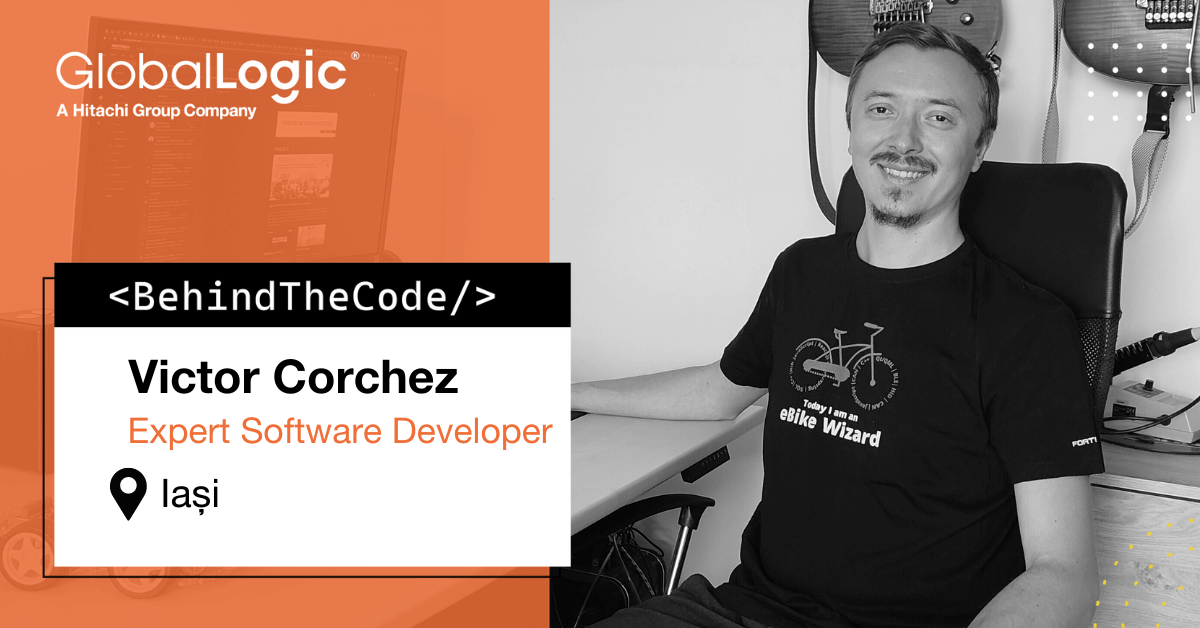Victor Corchez – Software Architect, on Playing with Smart Gadgets
11 December 202315 October 2014 | People
Join us as we explore the story of Victor Corchez, a Software Architect. Discover his current project, which revolves around creating Internet-connected smart devices. Additionally, explore his interests, ranging from working with smart gadgets to tinkering with them in his leisure time. It is one of the first synergy projects in our integration journey with GlobalLogic.
Get a glimpse of #BehindTheCode. Follow Victor’s interview and gain insights into the challenges he faces, such as integrating multiple components while optimizing code size and speed, and how he overcomes them with creativity and experience.

Hello Victor, could you please tell us a bit about yourself?
I studied Computer Science at the Gheorghe Asachi Technical University in Iasi. Initially, I chose this major as a joke, along with three of my high-school colleagues, without fully understanding its implications. However, my parents always emphasized that “computer science is the FUTURE,” thus influencing my decision. Surprisingly, we were the only ones from our entire Informatics high school class to choose this path.
During that time, my interests leaned more toward the arts, particularly playing the guitar, a passion I still pursue. To me, computers have always meant the joy of playing video games. Therefore, the initial stages were challenging. I even considered quitting due to my struggles with mathematics, which is clearly not my strongest subject. However, by the third year, after overcoming various math-related courses, we explored computer science and discovered my affinity for embedded programming. It was a turning point for me, as I developed a strong interest in both software development and hardware. Looking back, I believe this fascination came from my childhood experiences of disassembling toys to study their internal mechanisms.
Please describe your career journey and your current role.
When I first joined the company, I started working on an exciting embedded eBike project. Unfortunately, the project was discontinued six months later due to the client’s financial difficulties. Although disappointed, I spent the following six months on the bench working on an internal project with some teammates from my previous assignment. Together, we developed a new project based on our own ideas, focusing on implementing an embedded product test suite.
Then, I accepted the challenge of transitioning to C++/Qt in an eBike mobile app project. The eBike onboard computer is one of the world leaders in its segment. Fortech provides the full stack solution – an embedded application, a web portal, and mobile applications. Our project involved creating an app with remarkable features tailored to passionate eBike riders. I grew fond of this technology due to its ability to create cross-platform apps for both desktop and mobile. Throughout this project, I gained extensive knowledge and eventually took on the role of technical team lead.
Tell us more about one favorite project.
Fortech’s acquisition by GlobalLogic brought about changes and new opportunities. I was one of the first to take on the challenge and started to work on an interesting project. Since March, I’ve been involved in a new embedded IoT project with the GlobalLogic team. Our client was a major company specializing in making smart devices like doorbells, cameras, and sensors. We were developing a mobile app for a smoke detector that connects to the Internet. It sent notifications to the user’s phone if it detected anything unusual, making their lives safer. I am pleased to be part of one of the first synergy projects, which plays a significant role in our integration journey with GlobalLogic.
What was the project’s tech stack like?
The project primarily relied on embedded C and CMake, along with various libraries and software components, which were incredibly useful. We used Visual Studio Code (VSCode) as our integrated development environment (IDE) and Gerrit for code review.
What was your favorite thing about this project? And the most challenging one?
I particularly liked that this project included a smart device that can be accessed and configured through a mobile app over the Internet. I have a genuine passion for small gadgets controlled by mobile apps via Wi-Fi, and I even spend my free time tinkering with them.
From my perspective, the most challenging aspect of the project was the integration of multiple design components while maintaining a small memory footprint and ensuring speed. Striking a balance between the code’s size and speed is always a software development challenge. However, with creativity and experience, we managed to overcome it. This task of merging different elements while focusing on efficiency made us think creatively and draw upon our past experiences.
How about the team? What was the vibe in there?
The entire team operated remotely from various GlobalLogic and Fortech locations in Poland and Romania. We followed an Agile approach, doing our best to collaborate and create an excellent product for our clients. Since the project was relatively new and the team was young, we were still getting to know each other better. However, we definitely had plenty of fun along the way.
Recently, Fortech became a GlobalLogic Company. What’s next in your career journey, and what do you expect?
I really enjoy the embedded world and the opportunity to collaborate with my colleagues on the project. However, at some point, I’ll be eager to return to the Qt world, as it holds a special place in my professional journey.
I am looking forward to value all new opportunities that change might bring to me, as I believe with GlobalLogic integration we will be able to explore many new possibilities.
Fortech

